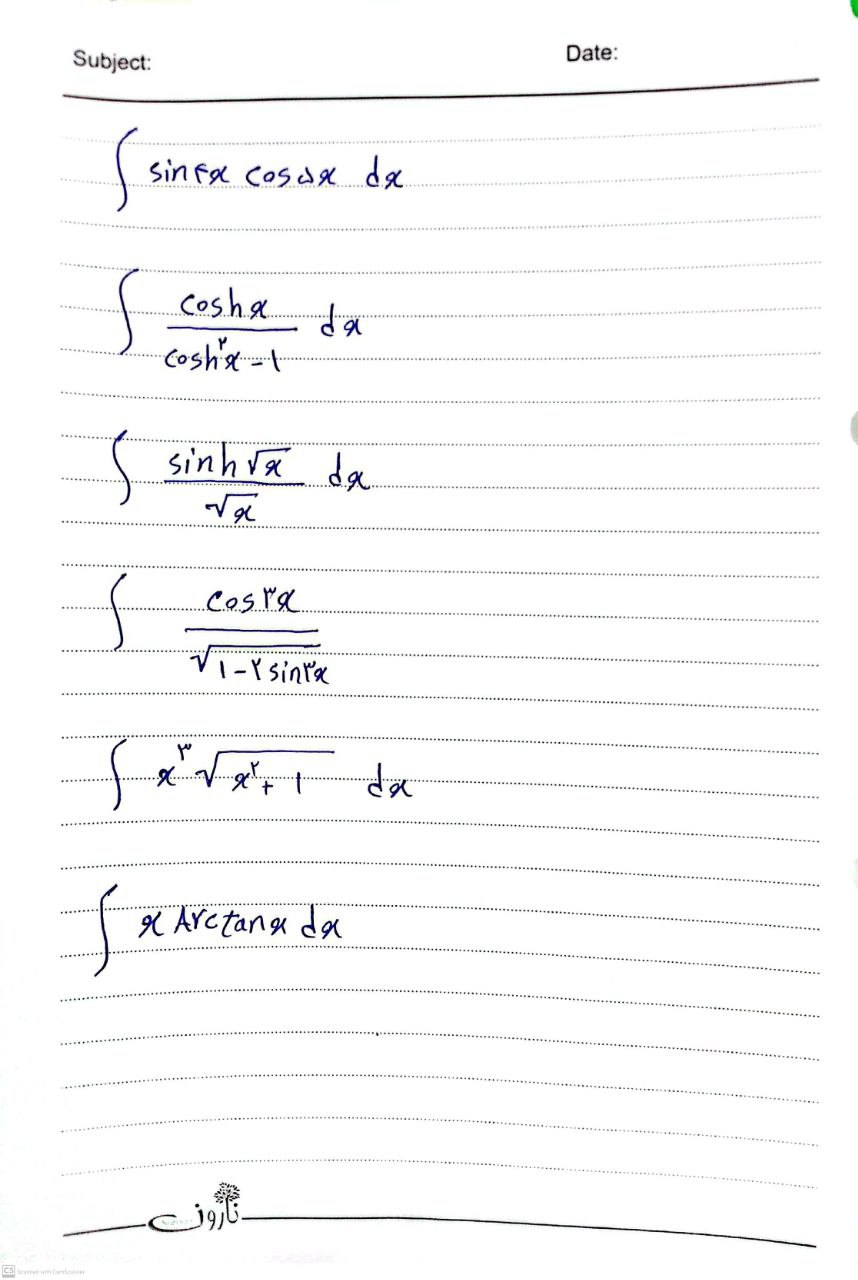∫ sin(x) cos(x) dx, ∫ cosh(x) / (cosh^2(x) - 1) dx, ∫ sinh(√x) / √x dx, ∫ cos(x) / √(1 - sin(x)) dx, ∫ x^3 / (√x + 1) dx, ∫ x Arctan(x) dx

Understand the Problem
The question presents a series of integrals that need to be solved step by step, involving various functions such as sine, cosine, hyperbolic sine, and polynomial expressions. The objective is to compute each integral accurately using calculus techniques.
Answer
1. \( -\frac{1}{4} \cos(2x) + C \) 2. \( -\coth(x) + C \) 3. \( 2\cosh(\sqrt{x}) + C \) 4. \( -2\sqrt{1 - \sin(x)} + C \) 5. (requires further steps) 6. \( \frac{x^2}{2} \arctan(x) - \text{(integral result)} + C \)
Answer for screen readers
-
( -\frac{1}{4} \cos(2x) + C )
-
( -\coth(x) + C )
-
( 2\cosh(\sqrt{x}) + C )
-
( -2\sqrt{1 - \sin(x)} + C )
-
(Requires additional steps for part two)
-
( \frac{x^2}{2} \arctan(x) - \text{(integral calculation)} + C )
Steps to Solve
- Integral of sin(x) cos(x)
Use the identity $ \sin(2x) = 2\sin(x)\cos(x) $ to rewrite the integral. Then we have: $$ \int \sin(x)\cos(x) , dx = \frac{1}{2} \int \sin(2x) , dx $$ Integrate: $$ = -\frac{1}{4} \cos(2x) + C $$
- Integral of cosh(x) / (cosh²(x) - 1)
Recognize that $ \cosh^2(x) - 1 = \sinh^2(x) $. Therefore: $$ \int \frac{\cosh(x)}{\sinh^2(x)} , dx = \int \csch^2(x) , dx $$ The integral of $\csch^2(x)$ is: $$ = -\coth(x) + C $$
- Integral of sinh(√x) / √x
Use the substitution $ u = \sqrt{x} $, then $ du = \frac{1}{2\sqrt{x}} , dx $, or $ dx = 2u , du $. Thus: $$ \int \frac{\sinh(u)}{u} (2u) , du = 2 \int \sinh(u) , du $$ The result is: $$ = 2\cosh(u) + C = 2\cosh(\sqrt{x}) + C $$
- Integral of cos(x) / √(1 - sin(x))
Use the substitution $ u = 1 - \sin(x) $, then $ -du = \cos(x) , dx $. Thus: $$ = -\int \frac{1}{\sqrt{u}} , du $$ This becomes: $$ = -2\sqrt{u} + C = -2\sqrt{1 - \sin(x)} + C $$
- Integral of x³ / (√x + 1)
Rewrite the integral: $$ \int \frac{x^{3/2}}{\sqrt{x} + 1} , dx $$ by dividing: $$ = \int (x^{3/2} - x^{1/2}) , dx + \int \frac{x^{1/2}}{\sqrt{x} + 1} , dx $$ The first part integrates to: $$ \frac{2}{5}x^{5/2} - \frac{2}{3}x^{3/2} + C $$ The second requires substitution or expansion.
- Integral of x Arctan(x)
Use integration by parts, where: $$ u = \arctan(x), \quad dv = x , dx $$ Then: $$ du = \frac{1}{1+x^2} , dx, \quad v = \frac{x^2}{2} $$ Applying integration by parts gives: $$ = \frac{x^2}{2} \arctan(x) - \int \frac{x^2/2}{1+x^2} , dx $$ Simplifying the remaining integral leads to a solution.
-
( -\frac{1}{4} \cos(2x) + C )
-
( -\coth(x) + C )
-
( 2\cosh(\sqrt{x}) + C )
-
( -2\sqrt{1 - \sin(x)} + C )
-
(Requires additional steps for part two)
-
( \frac{x^2}{2} \arctan(x) - \text{(integral calculation)} + C )
More Information
These integrals cover a variety of techniques in calculus, such as substitution, integration by parts, and using hyperbolic identities. Mastery of these concepts is essential for solving more complex integrals.
Tips
- Forgetting to apply integration techniques like substitution properly.
- Misidentifying hyperbolic identities.
- Not simplifying before integrating, especially in complex fractions.
AI-generated content may contain errors. Please verify critical information